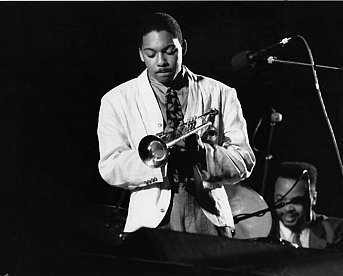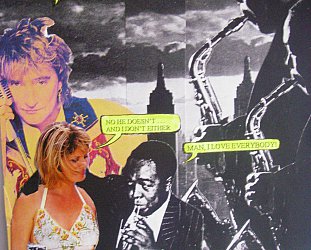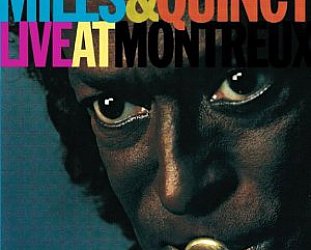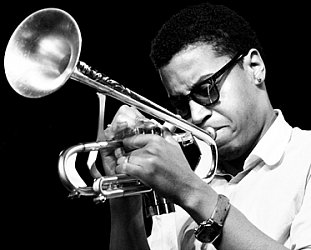Graham Reid | | 3 min read

Only a few jazz musicians have actually changed the course of the music: Louis Armstrong, Duke Ellington, Charlie Parker and Dizzy Gillespie, Miles Davis (twice, maybe three times) and Ornette Coleman undeniably reset the compass -- and Wynton Marsalis certainly did.
However many would qualify Wynton with, “but not in a good way”.
The trumpeter from New Orleans broke onto the scene 25 years ago. He was young, stylish, photogenic, articulate . . . and controversial.
Wynton earned his reputation early: he played in hometown bands, attended Berklee School of Music in Boston, joined Art Blakey’s Jazz Messengers in his late teens, and toured with Herbie Hancock. Fine credentials.
He signed to Columbia at 20, and immediately set out to save jazz from itself.
An unashamed and often smugly argumentative neo-conservative, he looked back to the days of Miles Davis’ late 50s quintets and argued forcefully that jazz had lost its way when it embraced rock (late 60s fusion) and the avant-garde movement of free jazz. Of course Wynton was too young to have experienced any of this first-hand so had no conception of how liberating they had been to musicians at the time.
No matter, he berated those who didn’t conform to his particularly narrow vision of jazz. Ironically the condescending neo-con movement -- looking down the wrong end of the telescope -- left itself nowhere to go other than even further back, which Wynton did when he shifted attention from the late 50s to Duke Ellington.
With his cheerleader, the critic Stanley Crouch -- another man comfortable browbeating those who wouldn’t conform to this vision -- Marsalis marginalised those who weren’t neo-cons, and made heroes out of fellow-travellers of whom we seldom hear much now.
Remember pianist Marcus Roberts? His last albums have been tributes to Scott Joplin, Ellington and Cole Porter, and he is now a professor of jazz in Florida.
Also an academic by inclination, Marsalis has juggled his jazz with a classical repertoire. While no one would impose constraints on what an artist might do, Wynton’s critics argued his frequent erring to the classics combined with his grand conceptual gestures within jazz (the 1991 three-disc series Soul Gestures in Southern Blue, for example) suggests he conceives jazz as a classical music.
Well, the critic Leonard Feather once observed, “jazz is the classical music of the 20th century” because in it you could hear the human condition in all its diversity reflected and refracted.
But jazz is not a branch of classical music: at its best it is an exciting, innovative and challenging music where the performer is simultaneously the composer. To place too many constraints on jazz is to kill it by conformity.
We don’t hear much about Wynton these days: his last jazz album was in 2005 and you have to go back a few years further for others. He records classical works, is the artistic director at the Lincoln Centre, picks up honorary degrees (about 30 so far), and in ‘97 he was the first jazz musician to be awarded a Pulitzer Prize for Music -- for his three-CD oratorio Blood on the Fields with the Jazz Orchestra of the Lincoln Centre.
But he’s back on a jazz kick -- and the man who once dismissed hip-hop and rap culture as regressive now adopts that voice for his new album, From the Plantation to the Penitentiary (Blue Note/EMI).
“You got to speak the language the people are speaking’, ’specially when you see the havoc it’s wreakin’ “ he raps (badly) on Where Y’all At?
He offers strong rebukes to the more base elements of the black entertainment industry: “I ain’t your bitch and I ain’t your ho. And this public niggerin’ has got to go,” sings Jennifer Sanon in Love and Broken Hearts, which also rails against “thug life coons, you modern day minstrels and your songless tunes“.
Surprisingly this is a cool-mood ballad, and has a real pretty tune with classy comping from pianist Dan Nimmer.
Again this finger-pointing Wynton album comes with liner notes by cheerleader Crouch. Consider this bewildering assertion. “Marsalis re-established the power and elegance of jazz in his time and for his generation and for all generations that came before and after his.”
Huh?
This isn’t jazz which swings as much as it thinks it does, because swing is in the heart not just in the metre. But it does have some lively passages; the funky country of Doin’ (Y)our Thing is humorous; Marsalis is in typically excellent playing form; and These Are Those Soulful Days is a gem of a ballad.
But overall the album refers to so many musical predecessors that one wonders where Wynton’s musical voice is, his lyrics aside.
Wynton Marsalis is -- despite his profile, power, former influence and the grand conceptions of his music -- a marginal figure in jazz these days.
Despite what Mr Crouch might want us to believe, I suspect he will be even more so in a decade.







post a comment